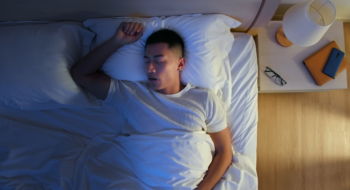If you frequently wake up feeling like you didn’t sleep a wink, you could be struggling with a sleep disorder.
It’s estimated nearly 50 million Americans struggle to get a full eight hours of sleep. That shortage of shut-eye can have major effects on physical and mental health, contributing to conditions such as high blood pressure and Type2 diabetes to memory problems and accidents.
If you’re wondering whether you may have a sleep disorder, ask yourself these four questions:
- Do you feel rested and refreshed when you wake?
- Do you feel excessive sleepiness during the day?
- Do you snore while sleeping?
- How much time is spent sleeping?
“These questions are the gatekeepers,” says Marissa McCaslin, respiratory therapy manager at Tidelands Health. “If you find yourself not feeling rested and refreshed when you wake, experiencing excessive daytime sleepiness and snoring or you find yourself waking up multiple times a night, you should consult your physician about a possible sleep disorder.”
There are nearly 100 possible sleep disorders from sleep apnea to narcolepsy to restless leg syndrome. All of them can result in broken sleep.
Your health care provider can diagnose a sleep disorder after a physical exam and a discussion about your sleep patterns. Ultimately, your physician may refer you to the sleep lab at Tidelands Georgetown Memorial Hospital for a more formal evaluation and to test out treatment options.
At the sleep lab, technicians will monitor your heart rate, breathing, oxygen levels and other indicators to determine the cause of your sleep problems.
For many patients, the diagnosis is sleep apnea — a sleep disorder that causes them to stop breathing periodically, according to McCaslin.
Sleep apnea occurs when the muscles in your mouth and throat relax during sleep, leading to a constricted airway. Obesity can be a major risk factor for sleep apnea, as well as smoking or a family history of sleep apnea.
Two other questions to consider that might indicate sleep apnea:
- Are you a male? Men are twice as likely as women to develop apnea.
- Are you a menopausal or perimenopausal woman? If so, you may be at higher risk for apnea.
One possible treatment for sleep apnea is a CPAP machine. The device uses air pressure to keep your airway open while you sleep.
Left untreated, sleep disorders such as sleep apnea can make existing health problems such as heart disease or Type 2 diabetes worse, McCaslin says.
“It intensifies those conditions,” she says.
If you have difficulty getting quality sleep, speak with your primary care physician. Your provider can thoroughly assess you and make sure your sleep difficulty is not caused by other health-related issues.





